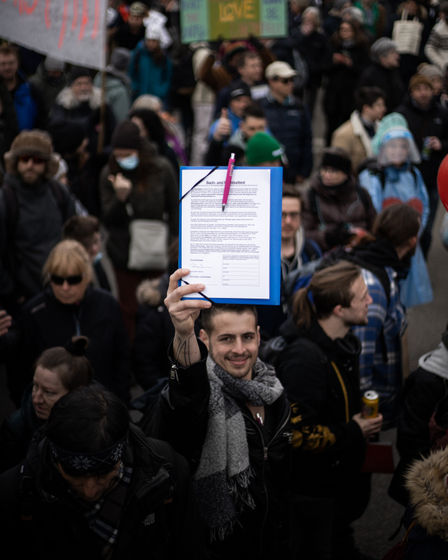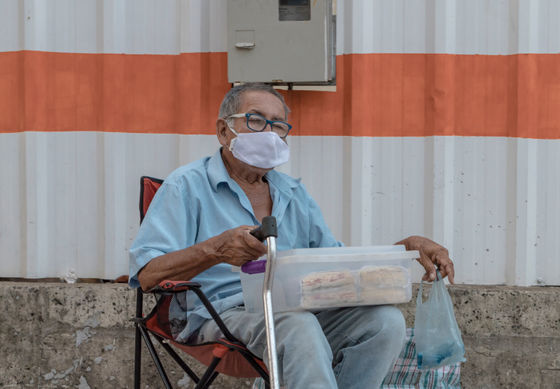Experts explain '5 things you shouldn't do & 10 measures you should do' about the new corona 'Omicron strain'

A new new coronavirus mutant 'B.1.1.529' has been discovered in South Africa that has more than 30 mutations including the mutation found in the delta mutant that has swept the world. Professor Shabir Madhi, a former director of the National Institute of Infectious Diseases in South Africa and a member of the World Health Organization (WHO) Strategic Advisory Board on Immunization (SAGE), for this new variant called the 'Omicron strain'. Explains '5 things you shouldn't do' and '10 measures you should do'.
Omicron is the new COVID kid on the block: five steps to avoid, ten to take immediately
On November 25, 2021, Nature, a major journalist, reported that 'new mutants with numerous mutations, including those found in delta mutants, are rapidly expanding in South Africa.' This mutant was expected to be called a 'new mutant' according to the Greek letter naming convention, but WHO says 'new' is similar to New and 'kusai' is used as the Chinese surname 'Xi'. I skipped these two letters because they resembled, and named it 'Omicron'.
A prospect called 'new mutant strain' where a 'new mutant strain' of the new corona with more than 30 mutations will be discovered --GIGAZINE

WHO named B.1.1.529 Omicron and at the same time recognized it as a Variant of Concern (VOC) with the highest alertness. It is said that this Omicron strain may have already spread from South Africa to the world, and some countries are beginning to restrict travel to South Africa and neighboring countries, and health authorities in each country are saying that Omicron is domestic. I am investigating the infection status of the strain.
According to the WHO announcement made on November 28, local time, although the infectivity of the Omicron strain and the severity at the time of onset are under investigation, those who have been infected with the new coronavirus infection (COVID-19) Even so, it is suggested that there is a high possibility of re-infection with the Omicron strain.
Maddy, who was the former director of the National Institute of Infectious Diseases in South Africa, where he discovered '5 things to do' and '10 measures to do' for Omicron strains, which are becoming a new global threat. The professor explains.
・ What you should not do # 1: Indiscriminately tightening regulations
According to Professor Maddy, regulations other than the prohibition of indoor meetings should not be indiscriminately tightened. There have been three waves of infection with the new coronavirus in South Africa, but blood tests have shown that 60-80% of people have been infected, and there are not many powerful infection control measures that could damage the economy. It was shown that it had no effect. For this reason, Professor Maddy suggests that 'imposing regulations with low compliance rates does not make sense.'
・ What you must not do # 2: Imposing travel restrictions
As shown by historical data, Omicron strains are expected to spread around the world with or without travel restrictions, and by the time travel restrictions are actually imposed, Omicron strains will be prevalent in the country. There is a high possibility. Professor Maddy argued that it would be more beneficial to tighten immigration and identify potential infected individuals than to impose travel restrictions. Can be said to be sweet. '
・ What you must not do # 3: Imposing infeasible or non-enforceable regulations
Professor Maddy says, 'We should announce regulations that are not practically feasible or non-enforceable, and stop pretending that the people are in compliance with those regulations.'
What to do # 4: Delay booster vaccination for people at high risk for COVID-19
WHO is an additional vaccination is referred to as a 'booster vaccination' to the high people of the risk to the COVID-19, such as a 65-year-old or older and immunocompromised encouraged we are. Professor Maddy said, 'The government should accept WHO encouragement and take the lead in booster vaccination as soon as possible.'
・ What you should not do # 5: Sticking to herd immunity
'Herd immunity does not happen while we are alive,' said Professor Maddy.

・ What to do 1: Make sure that the medical institution has staff, personal protective equipment, ventilator, etc., not only on paper but also in practice.
According to Professor Maddy, there are 2000 doctors and internship students in South Africa who are waiting for a decision on where to be assigned, and it has become clear that medical institutions are not ready to accept them.
・ What to do # 2: Give boosters to people who have been vaccinated with Johnson & Johnson (J & J) vaccine.
While J & J vaccines are 62% effective against Delta strains, mRNA vaccines such as Moderna and Pfizer vaccines have been shown to be 80-90% effective. The J & J vaccine is characterized by a single dose, but research has shown that a second dose enhances the effect of preventing hospitalization, so Professor Maddy told J & J vaccinated people. He insisted that booster vaccination should be done.
・ What to do # 3: Introduction of vaccine passport
'Vaccination may be an option, but the choice comes with consequences,' said Professor Maddy, who should introduce a vaccine passport to indoor spaces where people gather, such as public transport. I suggested. According to Professor Maddy, vaccination is more effective at preventing the transmission of infection to others than it is at preventing the infection of oneself.
・ What to do # 4: Reach out to unvaccinated people
With the idea that vaccination rates should be increased, Professor Maddy said, 'We should set up vaccination facilities in places where people are likely to gather and implement support programs that target unvaccinated people.'
・ What to do # 5: Booster vaccination should be given by people who are at high risk for the new coronavirus such as the elderly.
Since the primary goal of vaccination is to 'reduce the number of severely ill and fatalities,' a targeted strategy is needed to prioritize who.

・ What to do # 6: Encourage responsible behavior
'For a few irresponsible people, we shouldn't impose regulations such as alcohol restrictions that punish everyone,' Maddy said.
・ What to do # 7: Monitor the number of beds accepted at the local level
Since the number of hospitalizations is linked with the number of infected people in the city two to three weeks later, it is possible to detect in advance which medical facility is about to collapse in a specific area by monitoring the infection rate and hospitalization rate. That is.
・ What to do # 8: Learning to coexist with viruses
If you take a big hit against a pandemic, you will learn to coexist with the virus, because the impact on the economy, society, education, and mental health will be greater than the direct impact of the spread of the infection. Professor Maddy said that the direct and indirect effects should be determined.
And the following two are 'no explanation required' according to Professor Maddy.
・ What to do # 9: Follow science and do not distort science for political reasons
・ What to do # 10: Learn from past mistakes and take bold measures in the next step
Related Posts:
in Science, Posted by darkhorse_log






